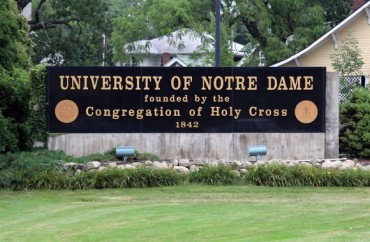
For the second consecutive year, the University of Notre Dame is offering a class on “white privilege” – designed to teach students about “oppression” – and earlier this week hosted a Black Lives Matter event that touted transfeminism over Dr. Martin Luther King Jr. and referred to police as a “big enemy.”
At the event, Opal Tometi and Patrisse Cullors, co-founders of the Black Lives Matter movement, told students at the private, Catholic university that the days of Martin Luther King as an African American hero are passé.
“We don’t need a black, Christian, cis-heteronormative man to take us to the Promised Land,” Cullors said at the event, titled “Black Lives Matter: The Hashtag Behind the New Civil Rights Movement,” which was held as part of the university’s Walk the Walk Week in honor of Dr. Martin Luther King Jr.
Though the women expressed gratitude to King, according to Cullors, the movement challenges “cisnormativity, heteronormativity, patriarchy” and pushes a “transfeminist lens.”
“We have intense U.S-centrism and we are obsessed with sort of ‘we built this country,’ right? While we forget about our siblings on the continent, our siblings in Latin America,” Cullors told the audience of about 500. “Our principles really uplift black women, cis and trans, to be in this dialogue.”
The Black Lives Matter movement was founded in 2013 in response to the acquittal of George Zimmerman, but it gained steam last year after the shooting death of Michael Brown and the resulting riots in Ferguson, Missouri.
“We were seeing our people mourning and taking to the streets and being met with tear gas, being brutalized, for having the audacity to call for attention to what happened,” Tometi said.
One student asked the speakers about the movement’s inclusion of LGBTQ individuals and the mainstream media’s lack of coverage of their involvement.
“The media regurgitates the same old, same old. And the patriarchy is a beast, and it continues to marginalize all of us, and continues to do a disservice to all of us,” Tometi said. “As we’re fighting structural racism, we’re also fighting the patriarchy, we’re also fighting transphobia, xenophobia, and the like.”
“I do not believe in prisons, in jails, in police, in court systems, as the way to punish our people, as a way for accountability. I’ve seen how it destroys and decimates individuals, families, and whole communities,” Cullors said later. “I believe in community solutions, relying on one another to decide how we’ll respond to harm.”
According to the speakers, their movement is made difficult by the fact that the police are a “very big enemy” that have “a lot of backing.”
The event was sponsored by Notre Dame’s Multicultural Students Programs and Services, Gender Relations Center, Center for Arts and Culture, Student Government, Department of Africana Studies and Division of Student Affairs.
“The Black Lives Matter discussion was illuminating in the sense that it provided a direct look into the motives and ideas of the movement’s architects,” said Notre Dame freshman Matt Connell to The College Fix. “However, while I am always encouraged by efforts to increase respect for human dignity in our culture, the Black Lives Matter movement seems to embrace an approach that disrupts and divides more than it reforms and unifies.”
“In addition, the movement appears to push an ideology that extends far beyond ensuring black lives are valued as every other life is valued.”
The talk comes in the wake of news that the university will again offer the controversial White Privilege Seminar course, which was offered for the first time in the spring of 2015.
Students are taught to be “more aware of injustices and better equipped with tools to disrupt personal, institutional, and worldwide systems of oppression.”
According to the White Privilege Conference (WPC)—which students in this course attend at the expense of the university—Christianity is one such system of oppression.
RELATED: Despite national criticism, Notre Dame moves forward with ‘white privilege’ class
The 2015 conference program defined the term “Christonormativity” as a “system of oppression which assumes Christianity as the norm, favors Christians, and denigrates and stigmatizes anyone that is not Christian” and “equates Americanness with Christianity.”
Last year, Notre Dame’s independent student newspaper the Irish Rover asked university spokesman Dennis Brown about the university’s funding of the trip to the conference. At the time, Brown said: “The theory of ‘white privilege’ is a well-established area of academic inquiry within sociology and certainly is a subject worthy of close examination by students who are interested in better understanding race relations.”
Brown did not respond to more recent requests for comment on the subject.
Like The College Fix on Facebook / Follow us on Twitter
IMAGE: Katherine Welles / Shutterstock.com






Please join the conversation about our stories on Facebook, Twitter, Instagram, Reddit, MeWe, Rumble, Gab, Minds and Gettr.